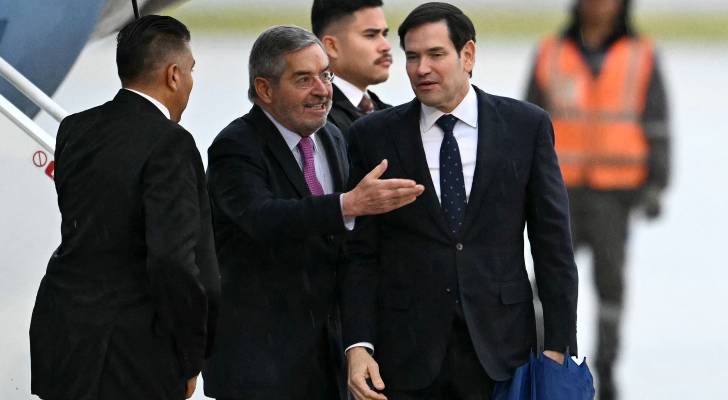US Secretary of State Marco Rubio is welcomed by Mexico's Secretary of Foreign Affairs Juan Ramon de la Fuente in Mexico City.
Rubio in Mexico as US says hit cartel near Venezuela
US Secretary of State Marco Rubio on Tuesday opened a visit to Mexico which warned against violations of its sovereignty, as the United States said it carried out a deadly strike on a drug-smuggling boat from Venezuela.
Rubio is paying the highest-ranking visit to the US neighbor since President Donald Trump returned to office in January with an agenda of cracking down on migration and drug cartels.
Mexico so far has navigated the treacherous terrain with Trump, with President Claudia Sheinbaum seeking to avoid confrontation.
Sheinbaum will meet Wednesday with Rubio, who was personally welcomed on the tarmac under overcast skies by Mexican Foreign Secretary Juan Ramon de la Fuente.
But hours before Rubio's arrival, Sheinbaum said she would draw a line on US military "intervention" in Mexico.
"The United States is not going to act alone because there is an understanding," she told reporters.
"We have been working for months on an understanding to collaborate on security matters," she said.
Mexico will not "accept violations of our territory, we don't accept subordination. Simply collaboration between nations on equal terms."
Trump said the United States killed 11 people Tuesday by destroying a speedboat allegedly from a gang linked to Venezuela's leftist leader Nicolas Maduro.
Rubio, speaking to reporters in Miami before departure, suggested it was not the last US attack and warned that the "days of acting with impunity" were over.
Trump has "been very clear that he's going to use the full power of America, the full might of the United States, to take on and eradicate these drug cartels, no matter where they're operating from," Rubio said.
The United States does not recognize Maduro and few expect similar attacks on Mexican soil, even if some of Trump's allies in Congress have mused of war.
Sheinbaum focuses on cooperation
Sheinbaum hails from Mexico's left but has been able to earn the respect of Trump, much like her predecessor and ideological ally Andres Manuel Lopez Obrador did in Trump's first term.
Mexico has cooperated on enforcement of the border against US-bound migrants, who mostly come from Central America or elsewhere rather than Mexico, and extradited people wanted by the United States.
She has also taken steps to curb imports from China, whose manufacturers have eyed Mexico as a way into the US market.
"President Sheinbaum from the beginning decided that she is going to seek a cooperative and collaborative relationship" with the Trump administration, said Jason Marczak, vice president and senior director at the Atlantic Council's Latin America Center.
"She has been emphatic in defending Mexican sovereignty, but at the same time reaching out to the United States and seeing where they can work together," he said.
The stability in the relationship marks a sharp contrast to Trump's pressure campaigns against the outspoken leftist leaders of two other Latin American powers, Brazil and Colombia.
Trump earlier this year even took the uncharacteristic step of crediting her with an idea on combatting fentanyl, the painkilling drug behind an overdose epidemic in the United States.
"I know everything, and I never learn anything from anybody, and I spoke to this woman, and as soon as she said it, I said, 'Exactly, what a great idea,'" said Trump, who has also commented favorably on the appearance of Mexico's first female president.
Sheinbaum is riding high in polls with the support of three-quarters of Mexicans, in part over how she has managed Trump, who rose to political prominence vowing to erect a wall to seal off the Mexican border.
The image of the United States has deteriorated more sharply in Mexico than in any other country since Trump returned, according to a Pew Research Center survey published in July, which found that 91 percent of Mexicans lacked confidence in Trump.




